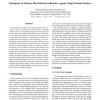557 search results - page 49 / 112 » Using Intelligent Agents to understand organisational behavi... |
111
click to vote
FCS
2007
15 years 1 months ago
2007
In many task-planning domains, dynamic assemblies of autonomous agents are replacing hierarchical organisations because they promise more agility. In such assemblies, interdepende...
95
Voted
IEAAIE
2011
Springer
14 years 3 months ago
2011
Springer
Persons with an Autism Spectrum Disorder (ASD) may show certain types of deviations in social functioning. Since the discovery of mirror neuron systems and their role in social fun...
123
click to vote
AAAI
1998
15 years 1 months ago
1998
One of the most important problems for an intelligent tutoring system is deciding how to respond when a student asks for help. Responding cooperatively requires an understanding o...
96
Voted
AAAI
1998
15 years 1 months ago
1998
Software agents "living" and acting in a real world software environment, such as an operating system, a network, or a database system, can carry out many tasks for huma...
98
Voted
ICTAI
2009
IEEE
15 years 7 months ago
2009
IEEE
Early primitive animals with simple feed-forward neuronal circuits were limited to reactive behavior. Through evolution, they were gradually equipped with memory and became able t...

